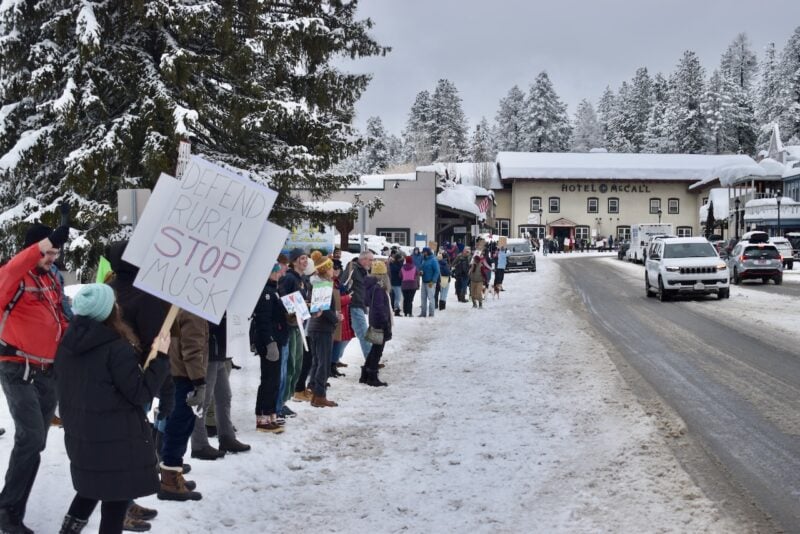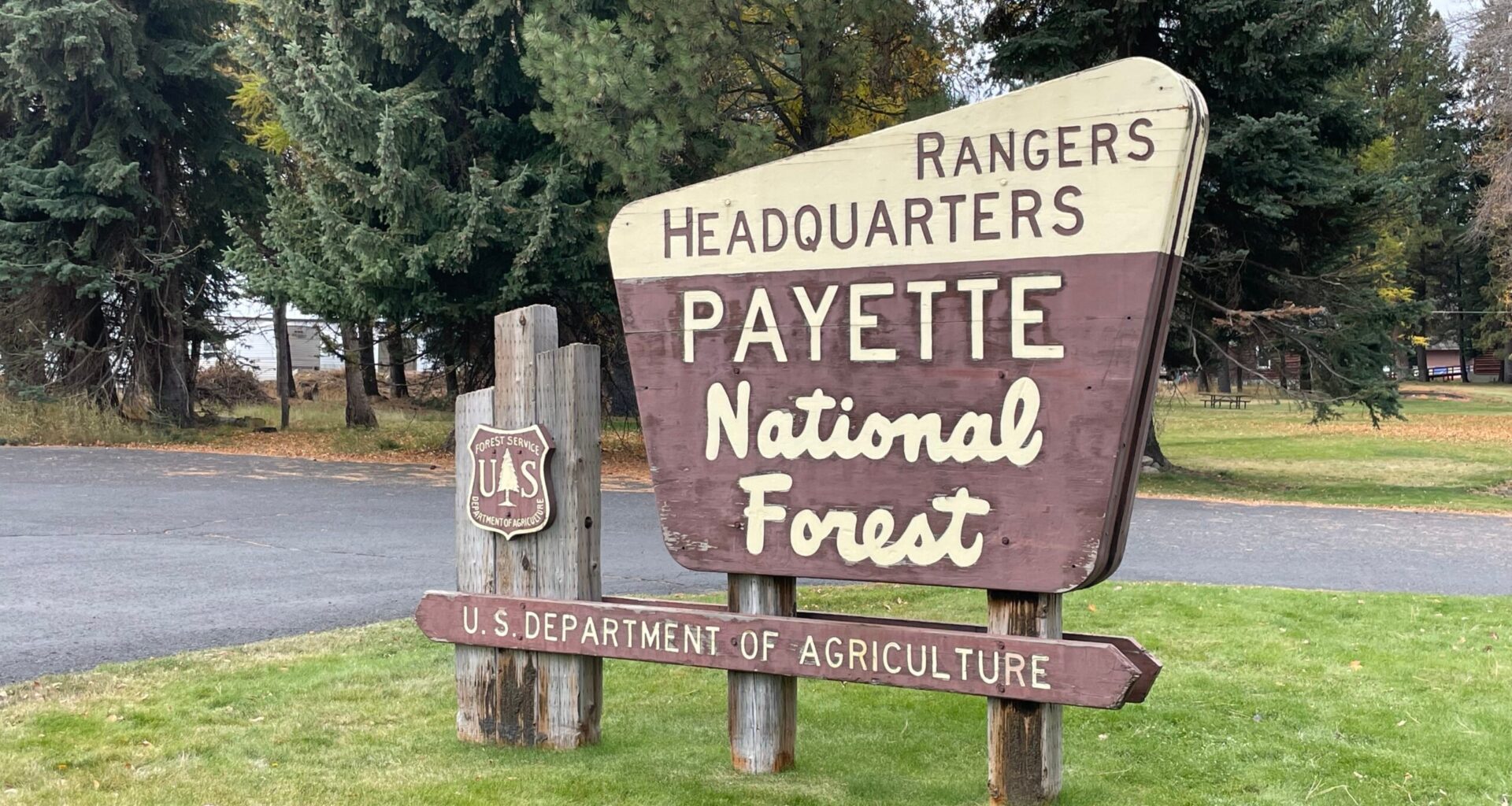Earlier this year, McCall resident Emily Kucharski was among thousands of Forest Service employees fired by the newly minted Department of Government Efficiency.
Kucharski, a trail crew lead and a winter ranger, was among 42 Payette National Forest employees hit by President Donald Trump’s push to reduce the federal workforce. Another 19 employees on the Boise National Forest were fired at the same time in February.
The terminations were temporarily lifted about six weeks later amid a court battle, though the U.S. Supreme Court ruled on the issue in July in favor of the Trump administration.
Despite the ruling, the administration scaled the DOGE firings back to not only exempt wildland firefighters, as originally planned, but also other employees holding wildland firefighting certifications, known as red cards.
“They just made sure that who they did terminate in those probationary periods did not have their red card,” said Brad LaPlante, a local representative for the National Federation of Federal Employees, the labor union for Forest Service workers.
The net result is fewer than 1% of the original 3,400 terminations across the Forest Service being upheld, with just 28 probationary employees fired nationwide — and none employed by the Boise or Payette National Forests.
“They are currently letting some probationary employees go so I’m not sure if it’s truly 28 in total, but that is the number that has been given to us by the agency,” said Matthew Brossard, a NFFE representative for the western region.
‘Enough is enough’
But for Kucharski and many others, the damage was already done. When offered a deferred resignation package last spring that meant she would continue receiving pay through September in exchange for leaving the agency, she took it.
“I went from having my dream job to having this nightmare of going into work,” said Kucharski, who is now working at Bistro 45 and planning to open a climbing gym in McCall. “It just got to the point where I was like, ‘enough is enough.’”
Kucharski’s story is not unique, according to local Forest Service employees who also serve as union representatives. Each current employee interviewed by Valley Lookout emphasized that they spoke on behalf of themselves and the union, not the Forest Service.
“I’ve heard from countless people that it just feels like one big, toxic workplace right now,” said Adam Larson, who represents about 800 employees who work in the Payette, Boise, and Salmon-Challis National Forests as the president of the local union chapter.
Larson, a trail crew foreman on the Payette, said the McCall Ranger District Office alone lost over half of its non-fire employees, including about a dozen to early retirements or deferred resignation packages offered by the Trump administration.
Without donors like you, this story would not exist.
Make a donation of any size here
The administration also carved out exceptions for employees holding red cards who agreed to the deferred resignation packages, allowing them to participate in wildfire-related assignments on a voluntary basis.
Although no employees on the Boise or Payette were lost to the DOGE firings, Larson estimated dozens of workers left the agency in their wake.
“A lot of them just wanted to get away from the chaos and the unsureness,” said LaPlante, a silviculture specialist on the Payette’s Council Ranger District.
 People lined Idaho 55 through downtown McCall on Feb. 17, 2025, to protest the firing of probationary employees on the Payette National Forest. Photo: Drew Dodson/Valley Lookout
People lined Idaho 55 through downtown McCall on Feb. 17, 2025, to protest the firing of probationary employees on the Payette National Forest. Photo: Drew Dodson/Valley Lookout
Sara Kososik, a union representative who works as a forester on the New Meadows Ranger District, agreed with the assessment by Larson and LaPlante. She said most of the 42 fired Payette workers who were reinstated took the deferred resignation package because court cases surrounding the legality of the DOGE firings were still pending.
“You can’t ask people to live life like that,” Kososik said. “We need stable incomes to live in this world. We just do.”
Brossard, the union representative for the entire western region, told Valley Lookout that he is seeing the same dynamic unfold nationally.
“I would say that is completely accurate,” he said.
Staffing strains to create long-term consequences
At the same time, the Forest Service remains under a federal hiring freeze, which means positions vacated by retirees, deferred resignations, and employees who sought work elsewhere remain empty.
“We’re cut to the bone,” Kososik said.
The effects of the empty positions were only amplified by the recent federal government shutdown, during which 113 Boise and Payette employees were furloughed, or about 20% of the total workforce between the two forests.
Among those furloughed was Larson, who said the shutdown came during a time in which he would be planning trail work for next summer, applying for grants to fund trail work, and coordinating partnerships with nonprofits and other trail groups to help complete the work.
The furloughs also extended to many of the scientific positions within the agencies, such as technicians for water quality and wildlife. Like Larson, those positions missed time usually reserved for planning work, grant applications, and volunteer recruitment.
“These bigger picture things, like the slow degradation of a trail crew, or the lack of staff to do clean air surveys and clean water surveys, are things that the public won’t feel, tangibly, for many years, potentially,” he said.
Kososik, a forester, and other positions related to timber management and wildfire continued working through the shutdown and were not furloughed.
Economic hardship amid missed paychecks
Furloughed employees are entitled to backpay for hours missed during the government shutdown, under a 2019 law. However, going six weeks without a paycheck pushed many workers to the brink financially.
For employees who continued working through the shutdown, paychecks stopped coming during the last two weeks, which means they are also awaiting backpay. Workers have been told to expect backpay checks as soon as Nov. 20, but Larson said he is “taking that with a grain of salt.”
“It does not change the fact that now we have people who haven’t gotten a paycheck in a few weeks,” he said, adding that the Forest Service is among federal agencies organizing food drives and donation campaigns for affected workers.
My Father’s Place, a popular burger restaurant in McCall, announced last week it would offer free meals to people affected by the government shutdown.
Meanwhile, a community potluck and donation campaign for affected Forest Service workers was organized last Sunday in Ponderosa State Park.
While those efforts have been helpful, they have not resolved the financial struggles felt by many furloughed workers, including LaPlante, who missed three paychecks during the 43-day shutdown— the longest in U.S. history.
“I had to pull out a loan through my bank just to make ends meet and picked up a side job to have a little walk-around cash,” he said.
‘I’m holding the line’
While morale is generally low within the Forest Service amidst this year’s upheaval, Larson and Kososik said it has bonded remaining employees closer together. It has also instilled a sense stubborn resolve in many workers.
“I’m holding the line,” Larson said. “You’ll have to fire me if you want me to stop providing these services to the American public. And that’s an increasingly common mentality.”
Kososik, who was not furloughed during the government shutdown but did work for two weeks without pay, expressed a similar sentiment.
“This is who we are in our core value system and we’re not going to just walk away from it because of the atmosphere of Washington D.C. right now,” she said.
